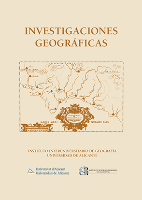
Investigaciones Geograficas-Spain
Scope & Guideline
Empowering scholars to tackle pressing environmental challenges.
Introduction
Aims and Scopes
- Spatial Analysis and Geography:
The journal emphasizes the importance of spatial analysis in understanding geographical patterns, including urban growth, land use changes, and environmental impacts. This includes methodological innovations in spatial modeling and geographic information systems (GIS). - Environmental Geography and Climate Change:
Research on environmental factors, including climate change effects on ecosystems, biodiversity, and human adaptation strategies, is a central theme. The journal addresses issues such as soil erosion, flooding, and vegetation changes in response to climatic variations. - Cultural and Economic Geography:
The interplay between cultural heritage, tourism, and economic activities is explored, highlighting case studies that examine how geography influences local economies and community development. - Social Geography and Human Behavior:
The journal investigates human perceptions and behaviors related to geography, including migration patterns, urban accessibility, and socio-economic disparities, providing insights into how geography shapes societal dynamics. - Methodological Contributions:
Innovative methodological approaches are a key focus, including qualitative and quantitative techniques for geographical research, data generation, and analysis in various contexts.
Trending and Emerging
- Impact of Climate Change:
There is an increasing focus on the impacts of climate change across various geographical contexts, including studies on flooding, vegetation changes, and ecosystem resilience, indicating a heightened awareness of environmental issues. - Sustainable Development and Conservation:
Research into sustainable development practices and conservation strategies is on the rise, reflecting global concerns about environmental degradation and the need for responsible resource management. - Socio-Economic Impacts of Migration:
Emerging studies on the socio-economic impacts of migration patterns, particularly in relation to urbanization and rural depopulation, indicate a growing interest in understanding demographic shifts. - Technological Innovations in Geography:
The integration of new technologies, such as remote sensing and GIS, in geographical research is trending. This includes innovative methodologies for data analysis and visualization, which enhance research capabilities. - Public Health and Geography:
There is an emerging interest in the intersection of public health and geography, particularly in the context of pandemics and their spatial implications, highlighting the relevance of geographical research in addressing health crises.
Declining or Waning
- Historical Geography:
Research focusing on historical geographical perspectives has decreased. While historical context remains important, there seems to be a trend towards more contemporary issues and immediate geographical challenges rather than historical analyses. - Traditional Agricultural Practices:
Studies centered on traditional agricultural practices and their geographical implications have waned, possibly due to a growing emphasis on modern agricultural techniques and sustainability. - Geopolitical Conflicts:
Analysis of geopolitical conflicts has become less prominent. Although still relevant, there appears to be a shift towards themes of cooperation, sustainability, and local governance rather than conflict-driven research. - Urban Planning and Policy Analysis:
While urban studies remain vital, there is a decline in papers specifically addressing urban planning policies. This may reflect a changing focus towards more empirical case studies rather than theoretical policy discussions. - Tourism Management in Established Destinations:
Research on traditional tourism management practices in well-established destinations has decreased, indicating a potential shift towards emerging tourism areas and sustainable tourism practices.
Similar Journals

Geo UERJ
Bridging Theory and Practice in Geographic ResearchGeo UERJ is a renowned open-access journal published by Universidade do Estado do Rio de Janeiro (UNIV ESTADO RIO JANEIRO), focused on the multifaceted study of geography and related disciplines. Established to foster innovation and disseminate high-quality research, Geo UERJ has been dedicated to making scholarly work accessible since its transition to open access in 2007. The journal aims to provide a platform for researchers, professionals, and students to share insights into geographical phenomena, environmental issues, and urban studies, contributing to the global discourse on sustainability and spatial analysis. Its publications serve as valuable resources for academicians looking to stay abreast of cutting-edge developments within the geography field. With the ISSN 1415-7543 and E-ISSN 1981-9021, Geo UERJ invites contributions from diverse perspectives, enriching the academic landscape with important geographic research from Brazil and beyond.

TIJDSCHRIFT VOOR ECONOMISCHE EN SOCIALE GEOGRAFIE
Bridging Economics and Geography for a Better TomorrowTIJDSCHRIFT VOOR ECONOMISCHE EN SOCIALE GEOGRAFIE, an esteemed journal published by WILEY, provides a premier platform for the dissemination of cutting-edge research within the fields of economics and social geography. With an ISSN of 0040-747X and an E-ISSN of 1467-9663, this journal has established itself as a pivotal resource, exhibiting a remarkable Q1 ranking in both Economics and Econometrics as well as Geography, Planning and Development for 2023. Notably, it is positioned in the 95th percentile among 821 journals in its category of Social Sciences, and ranks 46th among 716 in Economics and Econometrics, underscoring its influential role in shaping academic discourse. The journal, which has been in publication since 1967 and is anticipated to run through 2024, invites contributions that explore the intricate interplay between economic phenomena and social geospatial dynamics. Researchers, professionals, and students are encouraged to engage with its findings, which are crucial for understanding contemporary socio-economic challenges and innovations on a global scale.

Geographia Polonica
Pioneering Research in Geography and Urban StudiesGeographia Polonica is a premier academic journal published by the Polish Academy of Sciences, Institute of Geography and Spatial Organization, renowned for its contributions to the field of geography and related disciplines. With a history spanning from 1972, it has evolved into a vital resource for researchers and professionals, addressing a wide spectrum of topics from cultural studies to urban planning and development. Geographia Polonica is indexed with impressive rankings in various categories, including a Q1 classification in Cultural Studies and significant positions in Earth and Planetary Sciences and Urban Studies, reflecting its influence and recognition in these critical areas. Although it operates under a traditional subscription model, its commitment to high-quality, peer-reviewed research ensures that the latest findings and advancements are accessible to the academic community. With its rich archival content and contemporary insights, Geographia Polonica serves as an essential platform for scholarly dialogue, making it an invaluable reference for students, researchers, and professionals eager to explore the complexities of spatial organization and geographical phenomena in a global context.

Revista Geografica de America Central
Championing Open Access to Geographic Insights.Revista Geografica de America Central is a distinguished scholarly journal published by the UNIV NACL, ESCUELA CIENCIAS GEOGRAFICAS, focusing on the dynamic field of geography, particularly within Central America. Since its inception in 1974, the journal has championed the dissemination of open-access research, fostering collaboration and innovation among researchers, professionals, and students alike. With an evolving scope that reflects the region's rich geographical diversity, this journal serves as a vital platform for sharing empirical studies, theoretical advancements, and methodological discussions that enhance our understanding of Central America's unique environmental and socio-economic challenges. Although it has experienced various coverage periods, the journal remains committed to advancing geographic scholarship and supporting open academic discourse. Its open-access model ensures that essential knowledge is readily available to an expanding global audience, making it an invaluable resource in the field.
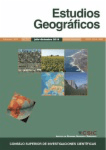
Estudios Geograficos
Shaping Insights, Influencing PoliciesEstudios Geograficos, a prominent journal published by the CONSEJO SUPERIOR INVESTIGACIONES CIENTIFICAS-CSIC in Spain, serves as a vital platform for advancing the fields of geography and earth-surface processes. With an ISSN of 0014-1496 and E-ISSN of 1988-8546, the journal has been committed to Open Access since 1996, ensuring that its valuable research is accessible to a global audience. Recognized as a Q3 journal in both Earth-Surface Processes and Geography, Planning and Development, it plays a crucial role in shaping understanding and policy related to our planet. As of 2023, it holds a respectable rank of 562nd in Social Sciences Geography and maintains a percentile standing, reflecting its significance within the academic community. Covering a diverse range of topics, Estudios Geograficos aims to foster scholarly dialogue and disseminate innovative interdisciplinary findings, providing researchers, professionals, and students with critical insights and tools to address contemporary geographic challenges.

Miscellanea Geographica
Fostering Dialogue for a Sustainable FutureMiscellanea Geographica, published by SCIENDO, is a prominent open-access journal established in Germany that contributes significantly to the fields of Earth and Planetary Sciences and Geography. With an ISSN of 0867-6046 and an E-ISSN of 2084-6118, this journal has been a platform for scholarly dissemination since 1984, encompassing a diverse range of interdisciplinary research areas. Since transitioning to open access in 2011, it has made its content widely available, enhancing visibility for researchers and practitioners across the globe. In the 2023 category quartiles, Miscellanea Geographica is ranked Q3 in both Earth and Planetary Sciences (miscellaneous) and Geography, Planning and Development, reflecting its commitment to quality scholarship. This journal is specifically designed to foster dialogue and collaboration among researchers, professionals, and students, making it a vital resource for those invested in the intricate relationships between geography and societal development. Researchers are encouraged to contribute groundbreaking studies that not only advance academic understanding but also address real-world challenges.
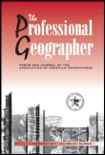
PROFESSIONAL GEOGRAPHER
Elevating the Discourse in Geography and Earth SciencesPROFESSIONAL GEOGRAPHER is a prominent journal in the fields of geography and earth-surface processes, published by Routledge Journals, Taylor & Francis Ltd. With a rich history dating back to 1949 and continuing through 2024, it serves as a vital platform for researchers, professionals, and students to explore and disseminate groundbreaking research and insights within the geographical sciences. The journal holds a respectable impact factor, placing it in the Q2 quartile for both Earth-Surface Processes and Geography, Planning and Development as of 2023, highlighting its importance in these critical academic areas. The journal ranks #273 out of 821 in Geography and Planning and #70 out of 179 in Earth and Planetary Sciences on Scopus, reflecting its robust contribution to advancing knowledge in social sciences. Although it does not currently offer open access options, it still provides invaluable content that influences pedagogy and research in geography. Its comprehensive scope invites a wide range of geospatial topics, encouraging interdisciplinary dialogue and collaboration across the global academic community.
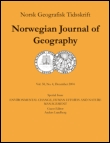
Norsk Geografisk Tidsskrift-Norwegian Journal of Geography
Fostering dialogue on pressing geographical challenges.Norsk Geografisk Tidsskrift-Norwegian Journal of Geography, published by Routledge Journals, Taylor & Francis Ltd, is a pivotal peer-reviewed journal that has been instrumental in advancing the field of geography since its inception in 1926. With an esteemed Q2 ranking in both Earth and Planetary Sciences and Geography, Planning and Development categories, it serves as a vital resource for researchers, professionals, and students seeking to deepen their understanding of geographical phenomena. The journal's rich historical archive, covering significant periods in geography and environmental studies, showcases a diverse array of articles that reflect ongoing research trends and challenges within the field. Despite not offering Open Access, its impactful content remains accessible through institutional subscriptions, underscoring the journal's commitment to advancing geographical research and fostering scholarly dialogue. As it continues to publish high-quality research, Norsk Geografisk Tidsskrift stands as a key player in geographical scholarship, reinforcing its importance within the academic community.
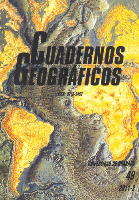
Cuadernos Geograficos
Fostering collaboration for a deeper understanding of geography.Cuadernos Geograficos is a distinguished open access journal published by UNIV GRANADA in Spain, dedicated to advancing the fields of geography, planning, and earth-surface processes. With an ISSN of 0210-5462 and E-ISSN 2340-0129, this journal has been serving as an essential platform for scholars since its inception in 1983. By providing rigorous peer-reviewed research, Cuadernos Geograficos contributes significantly to the academic discourse within these disciplines, holding a respectable position in the Q3 category for both Earth-Surface Processes and Geography, Planning, and Development as of 2023. The journal is indexed in Scopus, ranking #431/821 in Social Sciences and #100/179 in Earth and Planetary Sciences, affirming its relevance and impact within the scholarly community. With its commitment to open access since 1999, Cuadernos Geograficos ensures that vital research is accessible to a diverse audience of researchers, professionals, and students, fostering knowledge sharing and collaborative advancements in the geographical sciences.

Biblio 3W-Barcelona
Advancing knowledge in library and information science.Biblio 3W-Barcelona is a prominent academic journal published by the Universitat de Barcelona, Servei Publicacions, focusing on the dynamic field of library and information science. Established to foster scholarly communication, this journal provides a platform for researchers, professionals, and students dedicated to the advancement of bibliographic studies and library management. Despite lacking a current impact factor, Biblio 3W-Barcelona is recognized for its commitment to high-quality research and its contribution to the field, making it a valuable resource for those engaged in understanding the complexities of information dissemination in modern society. The journal features original research articles, critical reviews, and case studies that invite varied perspectives within the realm of librarianship. Readers can access its comprehensive body of work freely, enriching their knowledge and fostering practical applications in library science. For submission guidelines and further information, visit their website.